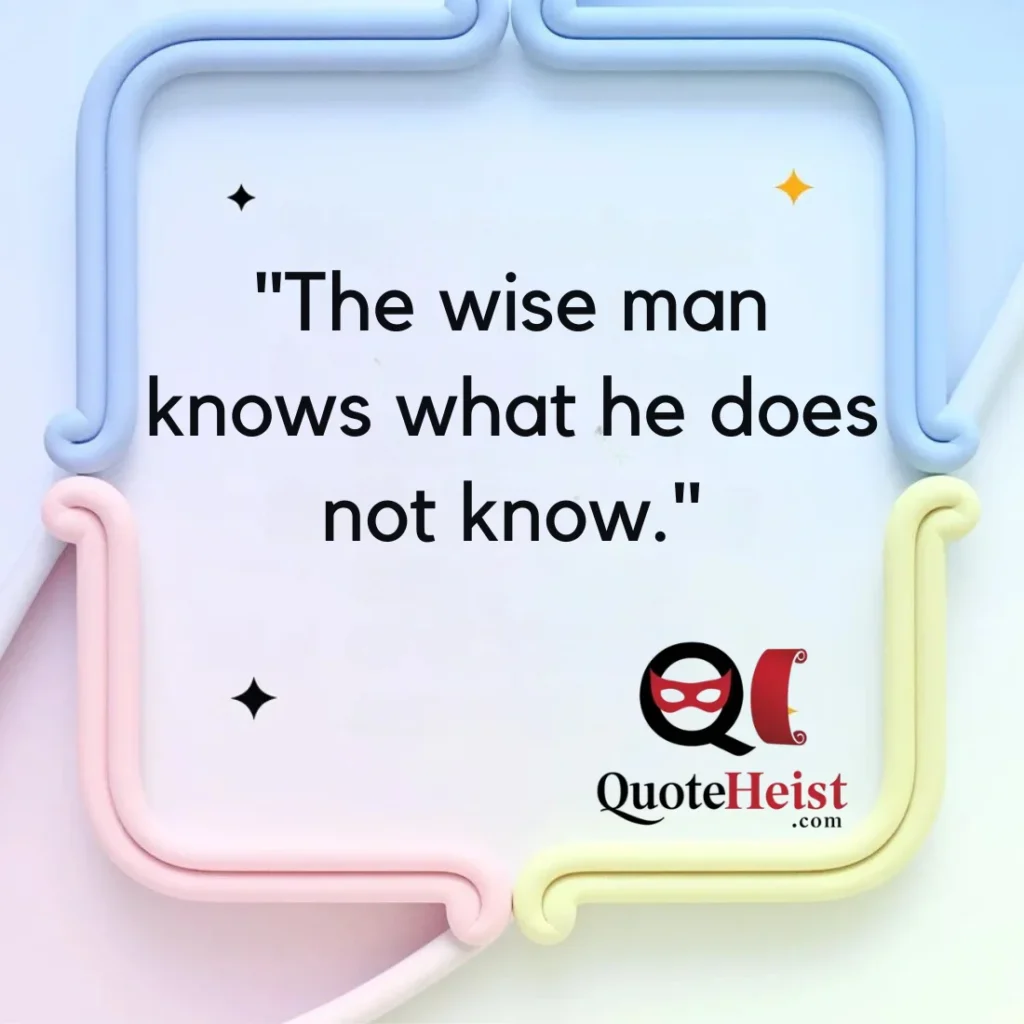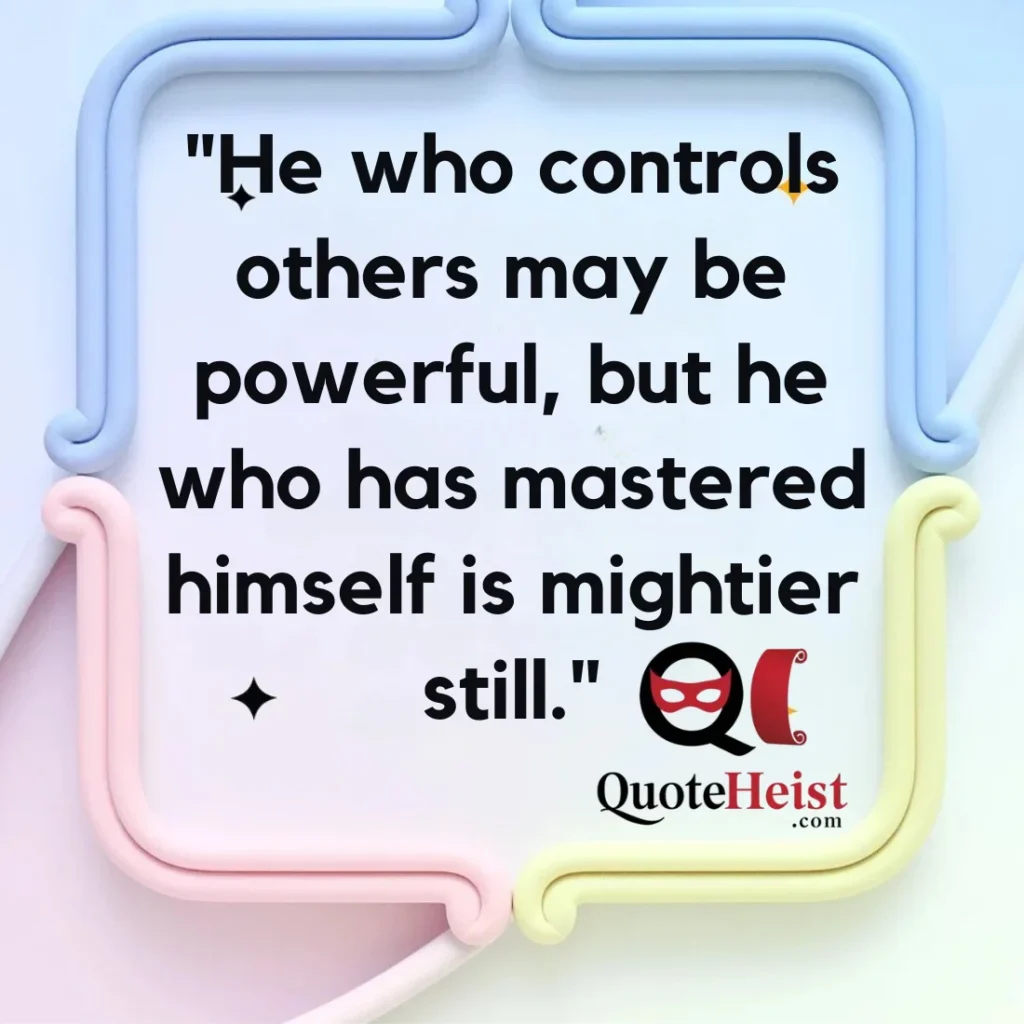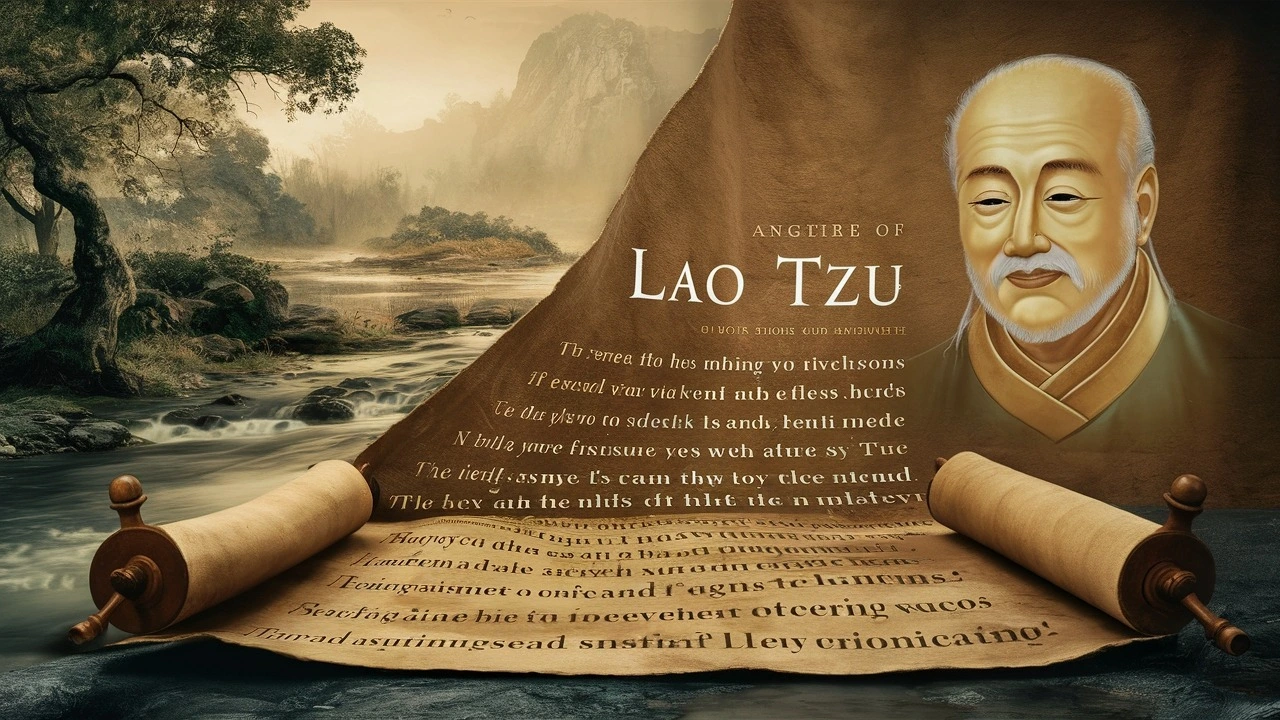Last updated on October 27th, 2024 at 07:46 am
Here are some of the most influential Lao Tzu Quotes, each accompanied by a brief explanation to help you understand their deeper meanings.
Lao Tzu, also known as Laozi, was an ancient Chinese philosopher and writer, known for founding Taoism.
His teachings are compiled in the Tao Te Ching, a text that has inspired countless individuals with its profound wisdom and insight into life, leadership, and the natural world.
The Way of Nature
“The journey of a thousand miles begins with a single step.”
Author: Lao Tzu
Description:
This quote emphasizes the importance of taking the first step, no matter how daunting a task may seem. It encourages action and persistence.
“Nature does not hurry, yet everything is accomplished.”
Author: Lao Tzu
Description:
Lao Tzu highlights the natural flow of life, suggesting that patience and natural progression are key to achieving goals.
“Knowing others is intelligence; knowing yourself is true wisdom.”
Author: Lao Tzu
Description:
This quote underscores the importance of self-awareness and understanding oneself as a higher form of wisdom compared to merely understanding others.
“The wise man knows what he does not know.”

Author: Lao Tzu
Description:
Recognizing one’s limitations and the continuous pursuit of knowledge is a hallmark of wisdom.
“When I let go of what I am, I become what I might be.”
Author: Lao Tzu
Description:
Lao Tzu speaks to the power of relinquishing one’s current identity and beliefs to unlock true potential and growth.
“A good traveler has no fixed plans, and is not intent on arriving.”
Author: Lao Tzu
Description:
This quote advocates for flexibility and openness to experiences, rather than rigidly adhering to a predetermined path.
“He who knows that enough is enough will always have enough.”
Author: Lao Tzu
Description:
Contentment and recognizing sufficiency in what one has is a source of lasting happiness and fulfillment.
“To the mind that is still, the whole universe surrenders.”
Author: Lao Tzu
Description:
Inner peace and calmness allow one to connect deeply with the world and perceive things more clearly.
“The softest things in the world overcome the hardest things in the world.”
Author: Lao Tzu
Description:
Lao Tzu illustrates the power of gentleness and flexibility over rigidity and hardness, symbolizing the strength in softness.
“If you do not change direction, you may end up where you are heading.”

Author: Lao Tzu
Description:
This quote warns against the dangers of complacency and the importance of being mindful of the path one is on.
Leadership and Governance
“To lead people, walk behind them.”
Author: Lao Tzu
Description:
Effective leaders support and guide from behind, allowing their followers to flourish and take ownership of their paths.
“A leader is best when people barely know he exists.”
Author: Lao Tzu
Description:
The best leaders work quietly and effectively, without drawing attention to themselves, allowing their team to shine.
“Govern a great nation as you would cook a small fish. Do not overdo it.”
Author: Lao Tzu
Description:
Lao Tzu advises minimal interference and gentle handling when governing, akin to cooking a delicate fish.
“When the best leader’s work is done, the people say, ‘We did it ourselves.'”
Author: Lao Tzu
Description:
True leadership empowers people to feel that they achieved success on their own, fostering independence and confidence.
“He who controls others may be powerful, but he who has mastered himself is mightier still.”

Author: Lao Tzu
Description:
Self-mastery and control are greater achievements than exerting power over others.
“In dwelling, live close to the ground. In thinking, keep to the simple. In conflict, be fair and generous.”
Author: Lao Tzu
Description:
Simplicity, humility, and fairness are key virtues in various aspects of life, including leadership.
“When the sage is in the world, he serves as an example of humility, restraint, and diligence.”
Author: Lao Tzu
Description:
Leaders should exemplify humility, self-restraint, and hard work to inspire and guide others.
“If you want to govern the people, you must place yourself below them.”
Author: Lao Tzu
Description:
Leaders must adopt a humble position, serving the needs of their people rather than elevating themselves above them.
“A great leader does not seek power; rather, he is chosen by the people for his wisdom and virtue.”
Author: Lao Tzu
Description:
True leadership is earned through wisdom and virtue, not through the pursuit of power.
“The more laws and order are made prominent, the more thieves and robbers there will be.”
Author: Lao Tzu
Description:
Overregulation and excessive control can lead to more resistance and rebellion, rather than harmony.
Wisdom and Knowledge
“He who knows others is clever; He who knows himself has discernment.”
Author: Lao Tzu
Description:
True understanding and discernment come from self-knowledge rather than just knowing others.
“By letting go, it all gets done.”
Author: Lao Tzu
Description:
Releasing control and trusting in the natural flow allows things to resolve themselves more effectively.
“Silence is a source of great strength.”
Author: Lao Tzu
Description:
Embracing silence can lead to inner strength and clarity, allowing one to reflect and understand deeply.
“To understand the limitation of things, desire them.”
Author: Lao Tzu
Description:
By experiencing desires, one can understand their limitations and the nature of true contentment.
“A wise man has no extensive knowledge; He who has extensive knowledge is not a wise man.”
Author: Lao Tzu
Description:
Wisdom does not necessarily come from accumulating knowledge but from understanding and applying it.
“He who talks more is sooner exhausted.”
Author: Lao Tzu
Description:
Excessive talking can lead to fatigue and loss of focus, whereas restraint in speech can conserve energy.
“Those who know do not speak. Those who speak do not know.”
Author: Lao Tzu
Description:
True knowledge often speaks through actions rather than words; those who know deeply often remain silent.
“In the end, the treasure of life is missed by those who hold on and gained by those who let go.”
Author: Lao Tzu
Description:
Clinging to things can lead to missing out on the true treasures of life, which are gained through letting go.
“The key to growth is the introduction of higher dimensions of consciousness into our awareness.”
Author: Lao Tzu
Description:
Personal growth comes from expanding one’s consciousness and awareness to higher dimensions.
“The wise are not learned; the learned are not wise.”
Author: Lao Tzu
Description:
There is a distinction between being learned and being wise; wisdom comes from understanding and experience, not just academic knowledge.
The Art of Living
“Life and death are one thread, the same line viewed from different sides.”
Author: Lao Tzu
Description:
Life and death are part of the same continuum, seen from different perspectives but fundamentally connected.
“Be content with what you have; rejoice in the way things are. When you realize nothing is lacking, the whole world belongs to you.”
Author: Lao Tzu
Description:
Contentment and gratitude for what one has lead to a sense of completeness and fulfillment.
“The flame that burns twice as bright burns half as long.”
Author: Lao Tzu
Description:
Intense and unsustainable efforts or lifestyles can lead to burnout and a shorter duration of effectiveness.
“A man with outward courage dares to die; a man with inner courage dares to live.”
Author: Lao Tzu
Description:
True courage is not just facing death but also embracing life with all its challenges and uncertainties.
“When you are content to be simply yourself and don’t compare or compete, everyone will respect you.”
Author: Lao Tzu
Description:
Authenticity and self-contentment lead to respect and harmony with others.
“Health is the greatest possession. Contentment is the greatest treasure. Confidence is the greatest friend. Non-being is the greatest joy.”
Author: Lao Tzu
Description:
True wealth and joy come from health, contentment, confidence, and embracing the concept of non-being or humility.
“New beginnings are often disguised as painful endings.”
Author: Lao Tzu
Description:
The end of one phase often marks the beginning of another, even if it initially appears painful.
“If you realize that all things change, there is nothing you will try to hold on to.”
Author: Lao Tzu
Description:
Embracing impermanence leads to a more peaceful and adaptable life.
“Those who flow as life flows know they need no other force.”
Author: Lao Tzu
Description:
Aligning with the natural flow of life allows for a harmonious and effortless existence.
“When there is no desire, all things are at peace.”
Author: Lao Tzu
Description:
Letting go of desires leads to inner peace and harmony.
The Power of Simplicity
“Simplicity, patience, compassion. These three are your greatest treasures.”
Author: Lao Tzu
Description:
Embracing simplicity, patience, and compassion brings profound value and richness to life.
“I have just three things to teach: simplicity, patience, compassion. These three are your greatest treasures.”
Author: Lao Tzu
Description:
The essence of Lao Tzu’s teachings lies in these three fundamental virtues.
“In dwelling, live close to the ground. In thinking, keep to the simple. In conflict, be fair and generous.”
Author: Lao Tzu
Description:
Simplicity, humility, and fairness are key virtues in various aspects of life, including leadership.
“He who knows that enough is enough will always have enough.”
Author: Lao Tzu
Description:
Contentment and recognizing sufficiency in what one has is a source of lasting happiness and fulfillment.
“When there is no desire, all things are at peace.”
Author: Lao Tzu
Description:
Letting go of desires leads to inner peace and harmony.
“The wise man knows what he does not know.”
Author: Lao Tzu
Description:
Recognizing one’s limitations and the continuous pursuit of knowledge is a hallmark of wisdom.
“By letting go, it all gets done.”
Author: Lao Tzu
Description:
Releasing control and trusting in the natural flow allows things to resolve themselves more effectively.
“The key to growth is the introduction of higher dimensions of consciousness into our awareness.”
Author: Lao Tzu
Description:
Personal growth comes from expanding one’s consciousness and awareness to higher dimensions.
“Those who know do not speak. Those who speak do not know.”
Author: Lao Tzu
Description:
True knowledge often speaks through actions rather than words; those who know deeply often remain silent.
“A good traveler has no fixed plans, and is not intent on arriving.”
Author: Lao Tzu
Description:
This quote advocates for flexibility and openness to experiences, rather than rigidly adhering to a predetermined path.
Peace and Harmony
“When you are content to be simply yourself and don’t compare or compete, everyone will respect you.”
Author: Lao Tzu
Description:
Authenticity and self-contentment lead to respect and harmony with others.
“When there is no desire, all things are at peace.”
Author: Lao Tzu
Description:
Letting go of desires leads to inner peace and harmony.
“Peace is the highest happiness.”
Author: Lao Tzu
Description:
True happiness comes from inner peace and tranquility.
“To understand the limitation of things, desire them.”
Author: Lao Tzu
Description:
By experiencing desires, one can understand their limitations and the nature of true contentment.
“In conflict, be fair and generous.”
Author: Lao Tzu
Description:
Simplicity, humility, and fairness are key virtues in various aspects of life, including leadership.
“Silence is a source of great strength.”
Author: Lao Tzu
Description:
Embracing silence can lead to inner strength and clarity, allowing one to reflect and understand deeply.
“By letting go, it all gets done.”
Author: Lao Tzu
Description:
Releasing control and trusting in the natural flow allows things to resolve themselves more effectively.
“He who knows that enough is enough will always have enough.”
Author: Lao Tzu
Description:
Contentment and recognizing sufficiency in what one has is a source of lasting happiness and fulfillment.
“To the mind that is still, the whole universe surrenders.”
Author: Lao Tzu
Description:
Inner peace and calmness allow one to connect deeply with the world and perceive things more clearly.
“When I let go of what I am, I become what I might be.”
Author: Lao Tzu
Description:
Lao Tzu speaks to the power of relinquishing one’s current identity and beliefs to unlock true potential and growth.
Self-Awareness and Understanding
“Knowing others is intelligence; knowing yourself is true wisdom.”
Author: Lao Tzu
Description:
This quote underscores the importance of self-awareness and understanding oneself as a higher form of wisdom compared to merely understanding others.
“The wise man knows what he does not know.”
Author: Lao Tzu
Description:
Recognizing one’s limitations and the continuous pursuit of knowledge is a hallmark of wisdom.
“To understand the limitation of things, desire them.”
Author: Lao Tzu
Description:
By experiencing desires, one can understand their limitations and the nature of true contentment.
“A wise man has no extensive knowledge; He who has extensive knowledge is not a wise man.”
Author: Lao Tzu
Description:
Wisdom does not necessarily come from accumulating knowledge but from understanding and applying it.
“Those who know do not speak. Those who speak do not know.”
Author: Lao Tzu
Description:
True knowledge often speaks through actions rather than words; those who know deeply often remain silent.
“He who talks more is sooner exhausted.”
Author: Lao Tzu
Description:
Excessive talking can lead to fatigue and loss of focus, whereas restraint in speech can conserve energy.
“In the end, the treasure of life is missed by those who hold on and gained by those who let go.”
Author: Lao Tzu
Description:
Clinging to things can lead to missing out on the true treasures of life, which are gained through letting go.
“The key to growth is the introduction of higher dimensions of consciousness into our awareness.”
Author: Lao Tzu
Description:
Personal growth comes from expanding one’s consciousness and awareness to higher dimensions.
“The wise are not learned; the learned are not wise.”
Author: Lao Tzu
Description:
There is a distinction between being learned and being wise; wisdom comes from understanding and experience, not just academic knowledge.
“The wise man knows what he does not know.”
Author: Lao Tzu
Description:
Recognizing one’s limitations and the continuous pursuit of knowledge is a hallmark of wisdom.
Patience and Persistence
“Nature does not hurry, yet everything is accomplished.”
Author: Lao Tzu
Description:
Lao Tzu highlights the natural flow of life, suggesting that patience and natural progression are key to achieving goals.
“The journey of a thousand miles begins with a single step.”
Author: Lao Tzu
Description:
This quote emphasizes the importance of taking the first step, no matter how daunting a task may seem. It encourages action and persistence.
“A tree that is unbending is easily broken.”
Author: Lao Tzu
Description:
Flexibility and adaptability are crucial for resilience and longevity, as rigidness leads to breaking under pressure.
“A journey of a thousand miles begins with a single step.”
Author: Lao Tzu
Description:
Emphasizes the importance of taking the first step toward a goal, no matter how daunting it may seem.
“To see things in the seed, that is genius.”
Author: Lao Tzu
Description:
Recognizing potential and understanding the implications of small beginnings is a mark of true insight and genius.
“If you want to lead the people, you must learn how to follow them.”
Author: Lao Tzu
Description:
Effective leadership requires understanding and following the needs and perspectives of the people.
“The more laws and order are made prominent, the more thieves and robbers there will be.”
Author: Lao Tzu
Description:
Overregulation and excessive control can lead to more resistance and rebellion, rather than harmony.
“A great leader does not seek power; rather, he is chosen by the people for his wisdom and virtue.”
Author: Lao Tzu
Description:
True leadership is earned through wisdom and virtue, not through the pursuit of power.
“When the best leader’s work is done, the people say, ‘We did it ourselves.'”
Author: Lao Tzu
Description:
True leadership empowers people to feel that they achieved success on their own, fostering independence and confidence.
“In dwelling, live close to the ground. In thinking, keep to the simple. In conflict, be fair and generous.”
Author: Lao Tzu
Description:
Simplicity, humility, and fairness are key virtues in various aspects of life, including leadership.
Flexibility and Adaptability
“The softest things in the world overcome the hardest things in the world.”
Author: Lao Tzu
Description:
Lao Tzu illustrates the power of gentleness and flexibility over rigidity and hardness, symbolizing the strength in softness.
“A tree that is unbending is easily broken.”
Author: Lao Tzu
Description:
Flexibility and adaptability are crucial for resilience and longevity, as rigidness leads to breaking under pressure.
“A good traveler has no fixed plans, and is not intent on arriving.”
Author: Lao Tzu
Description:
This quote advocates for flexibility and openness to experiences, rather than rigidly adhering to a predetermined path.
“Those who flow as life flows know they need no other force.”
Author: Lao Tzu
Description:
Aligning with the natural flow of life allows for a harmonious and effortless existence.
“If you realize that all things change, there is nothing you will try to hold on to.”
Author: Lao Tzu
Description:
Embracing impermanence leads to a more peaceful and adaptable life.
“The flame that burns twice as bright burns half as long.”
Author: Lao Tzu
Description:
Intense and unsustainable efforts or lifestyles can lead to burnout and a shorter duration of effectiveness.
“When I let go of what I am, I become what I might be.”
Author: Lao Tzu
Description:
Lao Tzu speaks to the power of relinquishing one’s current identity and beliefs to unlock true potential and growth.
“By letting go, it all gets done.”
Author: Lao Tzu
Description:
Releasing control and trusting in the natural flow allows things to resolve themselves more effectively.
“To lead people, walk behind them.”
Author: Lao Tzu
Description:
Effective leaders support and guide from behind, allowing their followers to flourish and take ownership of their paths.
“A leader is best when people barely know he exists.”
Author: Lao Tzu
Description:
The best leaders work quietly and effectively, without drawing attention to themselves, allowing their team to shine.
Humility and Modesty
“To lead people, walk behind them.”
Author: Lao Tzu
Description:
Effective leaders support and guide from behind, allowing their followers to flourish and take ownership of their paths.
“A leader is best when people barely know he exists.”
Author: Lao Tzu
Description:
The best leaders work quietly and effectively, without drawing attention to themselves, allowing their team to shine.
“When the sage is in the world, he serves as an example of humility, restraint, and diligence.”
Author: Lao Tzu
Description:
Leaders should exemplify humility, self-restraint, and hard work to inspire and guide others.
“If you want to govern the people, you must place yourself below them.”
Author: Lao Tzu
Description:
Leaders must adopt a humble position, serving the needs of their people rather than elevating themselves above them.
“He who knows others is clever; He who knows himself has discernment.”
Author: Lao Tzu
Description:
True understanding and discernment come from self-knowledge rather than just knowing others.
“To see things in the seed, that is genius.”
Author: Lao Tzu
Description:
Recognizing potential and understanding the implications of small beginnings is a mark of true insight and genius.
“He who controls others may be powerful, but he who has mastered himself is mightier still.”
Author: Lao Tzu
Description:
Self-mastery and control are greater achievements than exerting power over others.
“In dwelling, live close to the ground. In thinking, keep to the simple. In conflict, be fair and generous.”
Author: Lao Tzu
Description:
Simplicity, humility, and fairness are key virtues in various aspects of life, including leadership.
“He who talks more is sooner exhausted.”
Author: Lao Tzu
Description:
Excessive talking can lead to fatigue and loss of focus, whereas restraint in speech can conserve energy.
“By letting go, it all gets done.”
Author: Lao Tzu
Description:
Releasing control and trusting in the natural flow allows things to resolve themselves more effectively.










